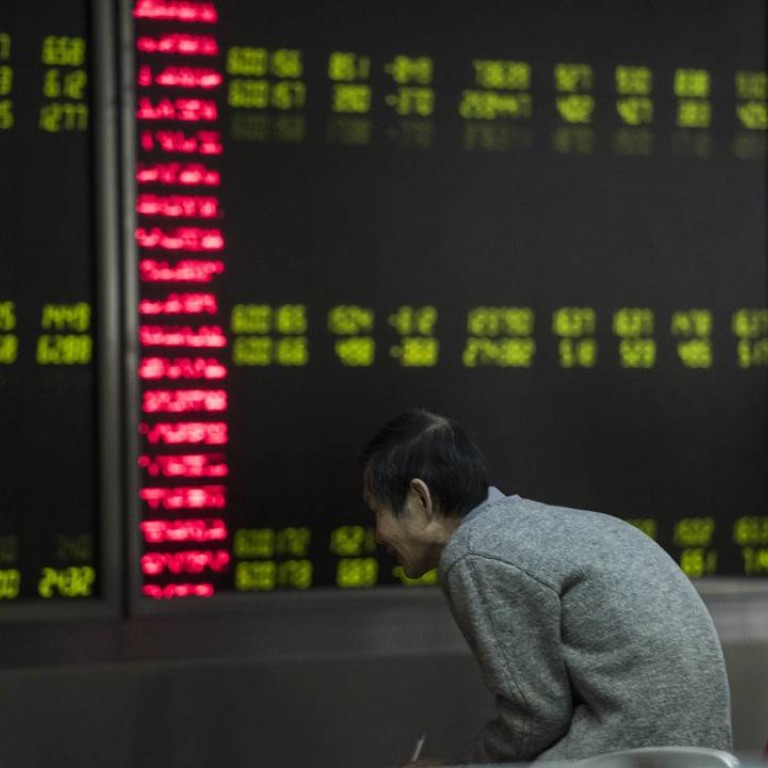
Risk-off sentiment dominates A-share markets after Thursday’s plunge
China central bank governor seeks to soothe investors
Risk-off sentiments dominated China’s A-share markets on Friday, despite regulators’ clarifying their stance after rumours of a rising supply of new shares saw the benchmark index plunge by more than 6 per cent on Thursday.
The benchmark Shanghai Composite Index rose 0.95 per cent on Friday to close at 2,767.21, after tumbling 6.41 per cent on Thursday. It fell 3.25 per cent for the whole week.
The Nasdaq-style ChiNext Index lost another 1.09 per cent to 2,014.92 in Shenzhen on Friday after falling 7.56 per cent on Thursday.
The China Securities Regulatory Commission (CSRC) issued an announcement ahead of the market opening on Friday morning denying a rumour that the listing process on the ChiNext board would be made easier.
Investors aggressively sold off shares on the ChiNext board on Thursday as rumours swirled that companies would face looser listing requirements on ChiNext from March 1, which would give a large boost to the supply of new shares and weigh on the valuations of existing listed companies.
Shanghai-based hedge fund analyst Eric Wu said the ChiNext board had attracted a lot of short-term investors in previous months, with many hard hit by Thursday’s plunge.
“Risk-off sentiment will dominate the A-share market in the short term, despite the CSRC’s clarification,” he said.
People’s Bank of China governor Zhou Xiaochuan sought to soothe investors on Friday as he talked about yuan, capital outflow and monetary policies at a press conference ahead of the G20 meeting in Shanghai.
Qu Hongbin, chief China economist with HSBC, said based on Zhou’s remarks the tone on monetary policy had shifted slightly from “prudent policy” to an “easing bias”.
“Governor Zhou reaffirmed that monetary easing remains effective and should be combined with fiscal expansion and reforms,” Qu wrote in a note. “This is in line with the continued easing of monetary conditions over the past months, which will help to accommodate fiscal expansion in order to support growth.”
The CSI 300 Index, tracking Shanghai- and Shenzhen-listed blue-chip companies, edged up 1 per cent to 2,948.03. The Shenzhen Composite Index fell 0.12 per cent to 1,736.54.
The Hong Kong market advanced amid a warming of global sentiment.
The Hang Seng Index closed 2.52 per cent or 475.40 points higher at 19,364.15, and was up 0.41 per cent for the week. The Hang Seng China Enterprises Index rose 2.06 per cent or 162.36 points on Friday to 8,034.30.
Cheung Kong Infrastructure’s share price rose 3.07 per cent to HK$79, after an announcement that it would become a Hang Seng Index constituent, eight years after it was removed from the blue-chip list.
Coal miners, insurance companies and utilities were among the best performers.
The gains on the mainland and in Hong Kong followed strong performances in the US and European markets on Thursday, with the Dow Jones and S&P 500 rising by more than 1 per cent after oil prices rose above US$33 a barrel.
Ample Capital asset management director Alex Wong said Hong Kong markets had been buoyed by strong overseas results and a positive investment climate.
“We had a very good US market and sentiment everywhere has been improving, except China,” he said. “We saw some upticks in blue-chip stocks like HSBC, which has been too low and is recovering.”
HSBC rose by 3.77 per cent to close at HK$49.55.
Additional reporting by Ben Westcott

